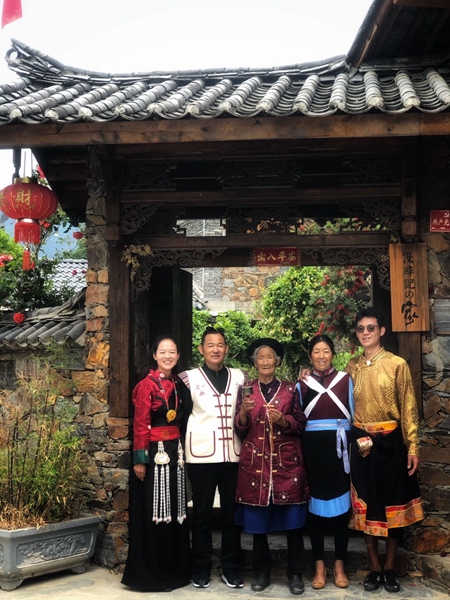Traveling toward prosperity
By Yang Yang | China Daily | Updated: 2020-07-28 07:53

Moving forward
He Xinhai not only developed such basic tourism services as driving, guiding and accommodation but also founded companies to produce such local specialties as wild walnuts and matsutakes.
He believes talent is key to tourism development, so he invited 40-year-old Liu Zhigang to join him.
Liu, who's from East China's Shandong province, has run guesthouses close to Dali's Erhai Lake for years. Liu came to Weixi for the first time in May 2018 and determined it to be promising.
In 2019, he invested 10 million yuan to cofound a boutique hotel with He Xinhai that offers views of the surrounding mountains.
The hotel sits in the middle of a large piece of open land and is close to the National Park for Yunnan Snub-Nose Monkeys and the Cave of Bodhidharma, the master of Zen who's said to have introduced Buddhism to China in the Southern and Northern Dynasties (420-581).
The front of the yard features a pond. Visitors can fish in the rice paddies, make tofu or pick matsutakes, Liu says.
The area's natural scenery features mountains, forests, highland-barley fields and the winding Lapu River set among special ethnic culture, he says.
"Especially before and during Spring Festival, people of different ethnic groups celebrate according to different but intermingling traditions, which is a very festive time," Liu says.
Demographic targets
The hotel, which also targets middle and high-end markets, has 17 rooms that cost from 680 yuan to 1,680 yuan a night. Liu and He Xinhai say this price positioning is the result of other considerations.
"It's a segment we're familiar with," Liu says.
"And it's easier to sell local specialties, such as walnuts from ancient trees and valuable mushrooms, to customers with big budgets."
Another reason, Liu says, is that they hope to open villagers' minds toward advanced business models, services and thought to upend poverty at its root.
"The hotels create a kind of community where villagers can, by participating in management, communicate with more open-minded customers, which is the key to how tourism can really change the countryside," Liu says.
"We want to play the role of a bridge that can connect cities and villages to increase the exchange of not only goods but also ideas."
























